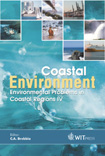Contribution Of Air Pollution To The Management Of Carbon Cycle On A Portuguese Coastal Region
Price
Free (open access)
Transaction
Volume
58
Pages
Published
2002
Size
534 kb
Paper DOI
10.2495/CENV020371
Copyright
WIT Press
Author(s)
A Monteiro, M Lopes, C Borrego & A I Miranda
Abstract
One of the main industrial areas of Portugal is located in a coastal region in the neighbourhood of Lisbon urban zone. In this region human activities coexist with natural ecosystems and in particular important forest areas can be found. Atmosphere, as well as flora (in particular the forest), are carbon reservoirs and take an important role on this element cycle. The air pollutant emissions affect air quality and can disturb other important components of carbon cycle due to atmospheric physical and chemical processes like photochemical production and dry/wet deposition. Mesoscale circulations, namely coastal breezes, are very important phenomena in this process of carbon cycle perturbation. The main objective of this work was to identify the carbon cycle changes induced by anthropogenic and biogenic emissions, providing relevant tools for management and planning of the region. Two main steps were considered: Identification and quantification of the most relevant carbon cycle relevance atmospheric emissions and characterisation of significant emission sources; Modelling and mapping of main CO2 and other carbon compounds concentrations patterns over the region through mesoscale numerical modelling of summer typical meteorological conditions. The results show a strongly heterogeneous distribution pattern of CO2 concentration levels and a significant contribution of anthropogenic sources to the global emission budget of the region. Transports and industrial combustion are sources of main concern, nevertheless forest have a significant contribution on carbon compounds emissions. Sea breezes have an important role on the transport of pollutants affecting air quality in coastal ecosystems.
Keywords





